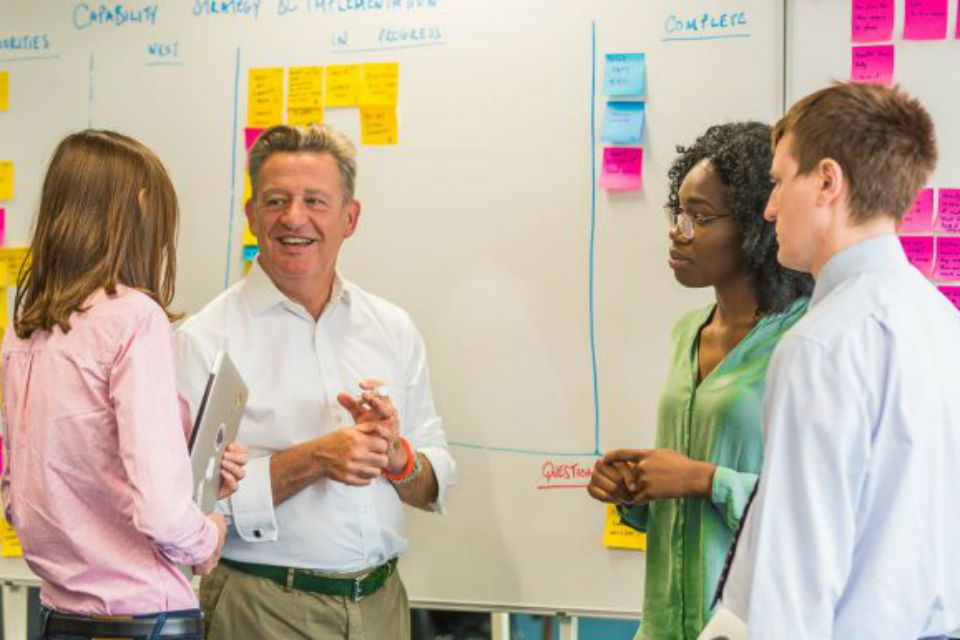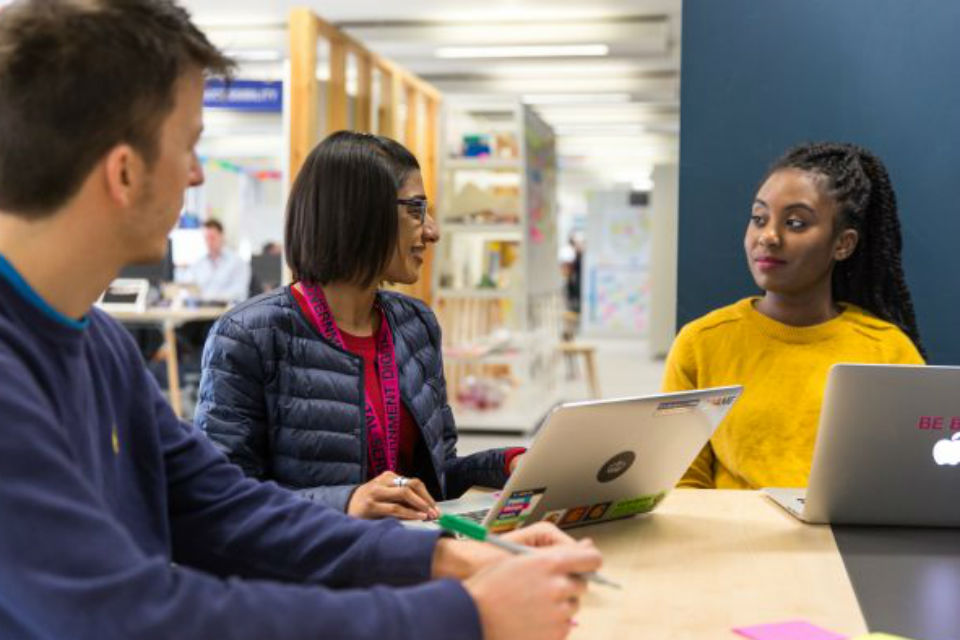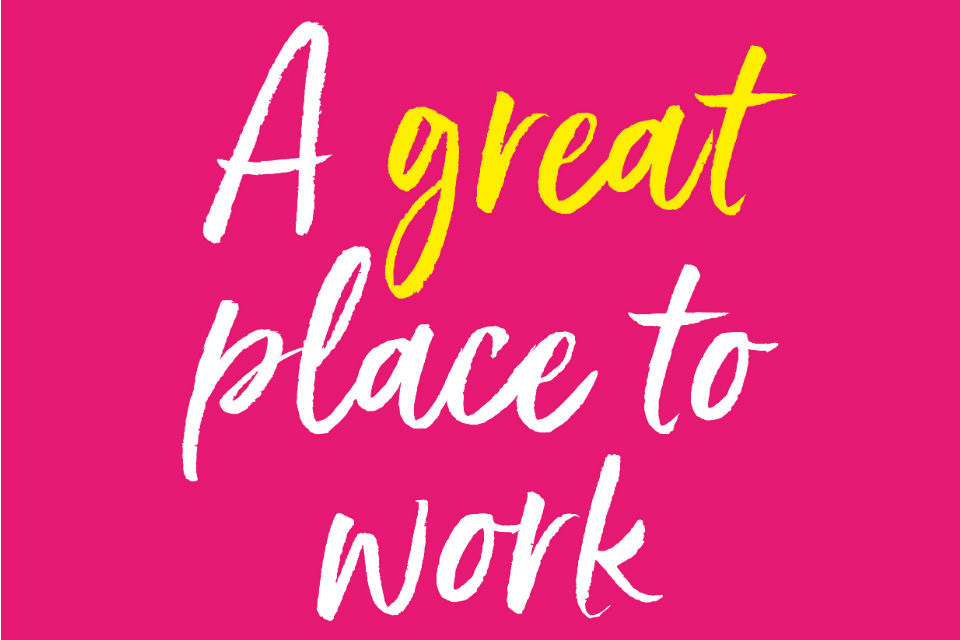
One of the core values underpinning the work of GDS is to ‘reflect the society we serve’. We aim to help government work better for everyone and will only achieve this if our organisation is as diverse as the society we serve.
Creating a diverse and inclusive workplace at GDS is a priority for us and we continue to make progress.
As Director General of GDS, and a Cabinet Office diversity champion, I take diversity very seriously, as do all the management team. As senior leaders, our focus should be on creating an environment that allows people to do good work.
Networks are key to this, providing support, organising training and hosting social events. We have a number at GDS, including the GDS Ethnic Minority Network, the GDS Mental Health Network and the GDS Women’s Network.
Last year, the Ethnic Minority Network organised an entire programme of events around Black History Month, including language lunch-and-learns, talks from colleagues who shared their life experiences, and a closing ceremony showcasing diversity of artistic expression within ethnic minority communities.
GDS staff and colleagues from across government said the events taught them new things, and inspired them to take action to improve ethnic diversity and inclusion in the workplace.
To support GDS on this journey, we appointed Tia Priest as GDS Diversity and Inclusion Manager. Her role is to work with colleagues to identify, improve and maintain opportunities to improve organisational culture and behaviour.
Practical steps
To increase the number of colleagues from ethnic minorities joining GDS, we did two things:
- we made it mandatory for everyone who sat on an interview panel to have unconscious bias training
- we ensured an ethnic minority representative on every interview panel, and compiled a list of ethnic minority volunteers from various backgrounds and with different specialisms
Because fewer people from ethnic minorities join at senior levels of GDS, we compiled a roster of senior colleagues from other organisations who could join interview panels for senior hires at GDS.
Sponsorship programme
To support the Civil-Service-wide commitment to increase ethnic minority representation at Senior Civil Servant (SCS) level, I’m taking part in the Cabinet Office Sponsorship Pilot programme. I will sponsor two ethnic minority Band A+ colleagues from GDS. This involves acting as an advocate for and supporting each person, introducing them to colleagues across government and recommending them when opportunities arise.
This month, Black History Month, I am also arranging a roundtable event. We will address how we can improve the career progression to SCS level of band A and A* DDaT (Digital Data and Technology) professionals from ethnic minorities. We will also discuss how we can attract external ethnic minority DDaT professionals at SCS level.

Standing by commitments
When I joined GDS, I spoke at an all-staff huddle and made the dual commitment that we would increase the proportion of women in the organisation and that we would have a gender-balanced management team. We have achieved both.
We’ve taken a number of steps to make GDS a better place to work, regardless of gender. This has included:
- looking at the gender pay gap within GDS (we continue to explore the data to understand the right interventions to put in place)
- making sure we provide as much support as possible for people on, or returning from, maternity and shared parental leave - content designer Helen Nickolls has written about how GDS helps her balance work and parenting
- supporting job-sharing opportunities, including at senior levels - for example Emily Ackroyd and Hazel Hobbs job-share the role of Director for Strategy and Engagement
- continuing with our pledge that no-one from GDS will take part in a panel discussion of two or more people unless there is at least one woman on the panel, not including the chair - an initiative developed and supported by the Women’s Network
At July 2018, just under half of people at GDS identified as women. That’s far more than the tech industry average at 17%.

Opportunities, not just interventions
Obviously it’s important to take direct action to improve diversity and inclusion in organisations. But sometimes projects that don’t have a specific diversity and inclusion element to them can have unforeseen benefits. The GDS Academy is one such.
When we launched the GDS Academy, the aim was to provide digital, data and technology training and to build capability across the Civil Service. What we didn’t realise is that this offer would be particularly popular among older civil servants.
The majority of people who have been through the academy - which is coming up to 10,000 people - have been over the age of 40. We had one student who was considering retirement before he went on an academy course and reinvigorated his career.
Diversity as a whole
 Diversity and inclusion goes beyond thinking about things like age, race and gender. GDS as an organisation serves the whole country, and that means being in the places where our users are. That’s why an important part of diversity and inclusion for us is ensuring we have a presence in the whole of the UK.
Diversity and inclusion goes beyond thinking about things like age, race and gender. GDS as an organisation serves the whole country, and that means being in the places where our users are. That’s why an important part of diversity and inclusion for us is ensuring we have a presence in the whole of the UK.
GDS has a national presence now. We have offices in Leeds, Manchester and Newcastle. Through the GDS Academy, we are extending our reach with pop-ups in Birmingham, Scotland - even in Canada! We also have a National, International and Research group, which looks at how we can improve our connections across the UK and further afield.
Diversity and inclusion should be at the heart of every organisation, as it is at GDS.

5 comments
Comment by mark mavin posted on
"continuing with our pledge that no-one from GDS will take part in a panel discussion of two or more people unless there is at least one woman on the panel, not including the chair - an initiative developed and supported by the Women’s Network"
-so similarly I am presuming there wouldn't be a panel that is all female?
Comment by Gavin Thomas posted on
Thank you for promoting this. My main concern is not the technology but the lack of awareness and consideration from some staff when using it. For example, I am still noting a large number of colleagues using the smallest font and in blue when drafting emails, which for some is a challenge to read! So if we want to be diverse we all need to use font sizes that can be read by anyone.
Comment by marcus fry posted on
Kevin , Thank you for the update on your equality, diversity and inclusion journey, really useful to share ideas to take back to digital, data and technology service within DEFRA.
So if diversity is at the heart of our government digital service where we do we put inclusion.?
Comment by Colin Moloney posted on
it's good to see a department taking seriously diversity and agree the actions GDS are taking clearly a good step forward.
However, I noticed there was no mention of any disability actions being taken GDS in the above article. It would have been good to hear about disability in GDS.
Comment by K Bowen-Lewis posted on
If your serious about ''Putting diversity at the heart of digital, data and technology” start by simplifying everything as an employee with learning difficulties written policy that I'm constantly being referred to is simply impossible to comprehend putting me at an obvious disadvantage in work